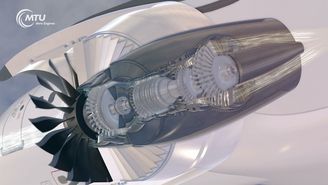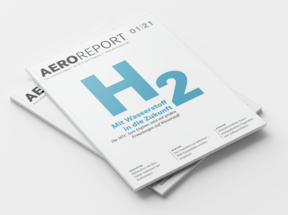
Press release
MTU Aero Engines: hydrogen puts the future at our fingertips
• Engine experts see three possible applications
Munich, October 5, 2020 – As the industry moves toward emission-free aviation, MTU Aero Engines welcomes the ZEROe concepts from European aircraft manufacturer Airbus. “Hydrogen is a highly attractive future option for us as an engine producer as well,” says MTU Chief Operating Officer Lars Wagner. “It should be used as a fuel right away,” he adds.
Germany’s leading engine manufacturer sees three possible uses for hydrogen: Converted to sustainable aviation fuels (SAFs), hydrogen could be dropped into existing aircraft and engines right away. “Direct combustion of liquid hydrogen in gas turbines is possible in technical terms, too,” says Dr Stefan Weber, Senior Vice President Technology & Engineering Advanced Programs at MTU in Munich, highlighting the second possible use. That would require some adjustments in the engine, especially the combustion chamber, which Weber thinks could be done in just a few years. By contrast, much larger challenges await for infrastructure and aircraft manufacturers, since they will have to find ways to provide and transport the liquid hydrogen and then carry it along inside appropriate tanks inside the aircraft.
In the long term, MTU is relying on a third option for using hydrogen: converting it into electricity by means of a fuel cell. This application is also described by the MTU experts in their Technology Roadmap for achieving emissions-free flight. This technology promises almost zero emissions, but it is still in the early stages of development in aircraft propulsion applications. “We call our fuel cell concept the flying fuel cell. We have an established team of experts working on it in Munich,” Weber explains. In August, MTU teamed up with the German Aerospace Center (DLR) to launch a cooperative project with the aim of demonstrating the new technology in a Do228.
MTU’s development work is also focusing on the further development of the gas turbine to leverage the full amount of potential available. Further optimized and combined with revolutionary drive concepts that significantly improve the cycle, considerable reductions in all emissions can be achieved. MTU is currently focusing on what is known as a WET engine (Water-Enhanced Turbofan). This concept reduces fuel consumption by more than 15 percent regardless of fuel type, considerably lowers all emissions – especially NOx levels – and, according to initial estimates, also reduces formation of contrails.
Lars Wagner explains: “We need both propulsion concepts – an optimized gas turbine combined with WET technology and fuel cells – because they have different areas of application.” The hydrogen-powered fuel cell is especially suitable for short- to medium-haul aircraft, as it requires less tank volume than in the case of long-haul aircraft. For these types of planes, gas turbines will continue to make sense for the foreseeable future. “But in that case, using SAFs,” Dr Stefan Weber sums up, adding, “Realizing the new technologies, and reaching our climate targets, will depend to a crucial degree on receiving appropriate funding, both nationally and at the European level.”
Contact

Director Corporate Communications
About MTU Aero Engines
MTU Aero Engines AG is Germany’s leading engine manufacturer. MTU’s core competencies lie in low-pressure turbines, high-pressure compressors, turbine center frames, manufacturing processes and repair techniques. In the commercial OEM business, the company plays a key role in the development, manufacturing and marketing of high-tech components together with international partners. Some 30 percent of today’s active aircraft in service worldwide have MTU components on board. In the commercial maintenance sector, the company ranks among the world’s top three service providers for commercial aircraft engines and industrial gas turbines. These activities are combined under the roof of MTU Maintenance. In the military arena, MTU Aero Engines is Germany’s industrial lead company for practically all engines operated by the country's military. MTU operates a network of locations around the globe; Munich is home to its corporate headquarters. In fiscal 2019, the company had a workforce of some 10,000 employees and posted sales of over 4.6 billion euros.




